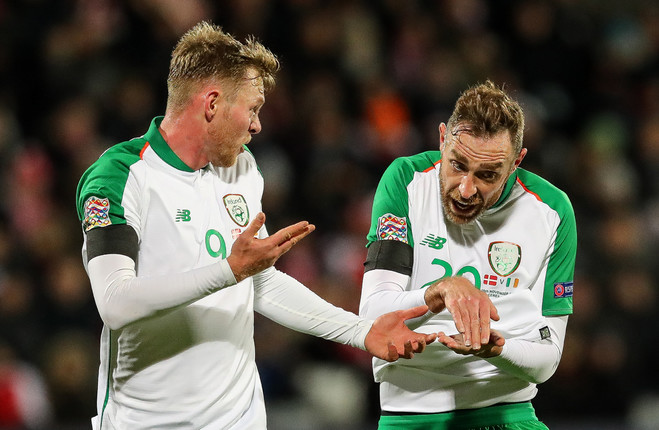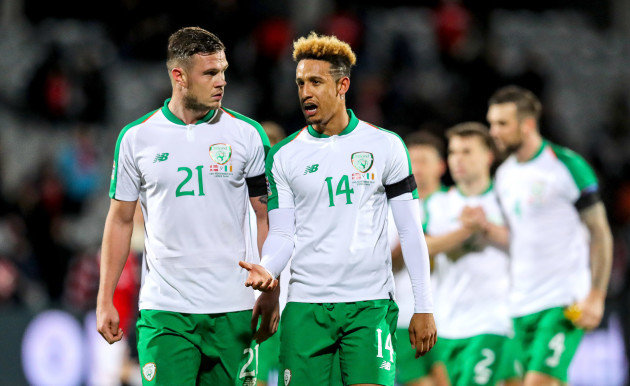THERE WAS A time, not so long ago, when Republic of Ireland matches were regarded as being among the highlights of any sporting calendar.
Some readers will remember counting down the days until the famous 2001 Lansdowne Road clash with Holland. Or trying to come up with an excuse to get off school or work for the 2002 World Cup qualifier second leg against Iran.
These memories seem distant now, and there are multiple reasons as to why. A key factor is the proliferation of football on TV over the past 20-30 years. What the majority of people watch week in week out, whether it is Premier League or Champions League, is of a better standard than ever. The international game, by contrast, has increasingly felt secondary.
But even if these changes had not been so extreme, the perception of the Irish team would surely still have altered dramatically in recent times.
There is a current widespread apathy about the national side that is almost the polar opposite of that summer in 2002 when it seemed as if the entire country was at loggerheads over Saipan.
There are, of course, the die-hard football fans who will follow the team regardless of the results or performances, but the Boys in Green are no longer entwined with the sporting consciousness of the nation, whereas once the two appeared to be linked so inextricably.
You could go as far back as 2002, when Mick McCarthy stepped down as manager, to pinpoint the beginning of the decline.
Brian Kerr, who had done such brilliant and unprecedented work at underage level, was unable to turn around the doomed Euro 2004 qualifying campaign and also oversaw failure to reach the 2006 World Cup.
After Steve Staunton’s appointment, supporters became more disillusioned with the set-up. It is easy to forget that this era was not totally devoid of positive results, such as draws with talented Germany and Czech Republic sides, but these rare plus points were overshadowed by 5-2 humiliations in Cyprus and last-minute winners against San Marino.
Following the former Liverpool and Aston Villa star’s ill-fated reign, Giovanni Trapattoni was appointed and brought a degree of stability back to the set-up initially. Overseeing Ireland narrowly missing out on a place in the 2010 World Cup amid an infamous play-off defeat to France as well as securing a first qualification for the European Championships since 1988.
And while it unquestionably brought the Irish side a level of success that they had not experienced for a decade, there was a dreariness to Trap’s style that failed to fully endear him to supporters.
When Martin O’Neill and Roy Keane took over, initially at least, there is no question they rejuvenated a tired team.
The standard of football has never been scintillating under the Derry native. But in the first three years of his reign, there was a definite spark mixed with the team’s old-fashioned attributes, such as hard work and compact defending.
O’Neill’s first competitive match, a 2-1 win over Georgia, for the most part was just as dour as many of the side’s recent outings, but an Aiden McGeady wonderstrike compensated for the team’s obvious failings.
Perhaps the most divisive Irish player of recent memory, Wes Hoolahan, also injected some life into proceedings, lending a degree of unpredictability to Ireland’s attack play, with the Norwich man integral to moments in tight games that just about turned would-be disappointments into remarkable successes (Austria away, as well as Italy and Sweden at Euro 2016, are a few examples).
But as ageing creative players such as McGeady and Hoolahan made way, the team’s shortcomings simultaneously became increasingly pronounced.
O’Neill’s well-documented unorthodox approach to tactics and preparation have not helped, nor have the lack of top-level players coming through.
But there is no single scapegoat in this instance. Ireland’s current situation is borne of a collective failure. While notable changes have been made in recent years, it is clear that there was a problem with player development for several post-Brian Kerr years that is ultimately seriously impacting on the national side now. Ireland’s attack last night consisted of Aiden O’Brien and Callum O’Dowda, two Championship players who came through English academies. When their efforts proved fruitless, Michael Obafemi and Callum Robinson, two more players raised in the English system, were introduced.
And while the players are limited technically, there is increasingly evidence that they are still underachieving at present, when they are routinely outplayed by sides such as Georgia and Northern Ireland, who the Republic traditionally would be expected to, at worst, be on a level playing field with.
Last night in Aarhus felt like the summation of a dreadful 12 months. A game with no highlights to end a year of no highlights.
Stats can sometimes be deceiving, but in this case, they tell a convincing story. According to the BBC, the visitors had 25% possession overall. Ireland had three shots, compared with Denmark’s 26, and failed to find the target once over the course of 90 minutes.
It was very similar to the last time the sides met in Denmark — a game that also finished 0-0 — but Ireland at least had an excuse on that occasion. The logic being that a draw supposedly represented a decent result to take back to Dublin for the second leg of their World Cup play-off.
Last night, in a dead rubber, Ireland bafflingly looked determined to play for a 0-0 draw. It was the type of football favoured by minnows such as San Marino and Gibraltar when up against a clearly superior side. 11 bodies were stuck behind the ball and the concept of attacking football was virtually disregarded amid a glorified friendly in which Ireland had nothing to lose.
If O’Neill was criticised for being too adventurous in replacing two holding midfielders with McGeady and Hoolahan at half-time of that demoralising 5-1 thrashing by the Danes in Dublin, the opposite accusation could be levelled at the veteran manager on Monday evening — he was being needlessly cautious in setting up his side with a defender, Cyrus Christie, in midfield, while adopting what realistically turned out to be a 5-4-1 formation with nearly every Irish player in their own half for the vast majority of the contest.
Although he could point to another clean sheet and claim it as progress against the dreaded Danes, there are several other facts that will not make for pleasant reading from O’Neill’s perspective. It is the first time Ireland failed to get a shot on target in 18 games. It is the first time since May 1996 that they have failed to score in four consecutive fixtures. And they are now without a win in six matches in all competitions.
Their overall 2018 record is no more encouraging. They have managed just four goals this year. Two against a severely under-strength USA team. One consolation in a 4-1 defeat by Wales. And another in low-key friendly with Poland. They have prevailed in just one of their nine matches, while it was confirmed on Friday that they had been relegated from their Nations League group and will go into next month’s Euros draw as third seeds.
Despite supporter unrest, it does not look as if Keane and O’Neill will be going anywhere anytime soon, having recently signed new contracts. The team have gone from being bad to unwatchable over the past 12 months, and there is only one possible way the management and the players can redeem themselves in this increasingly dire-looking situation.
There are 55 countries that are part of Uefa and 24 — just under half — will be compete at Euro 2020. Over the past 12 months, there has been almost no evidence to suggest that Ireland will be one of these teams, but to restore some pride and simply make people care about the Irish team again, qualification is pivotal.
Subscribe to our new podcast, Heineken Rugby Weekly on The42, here:


